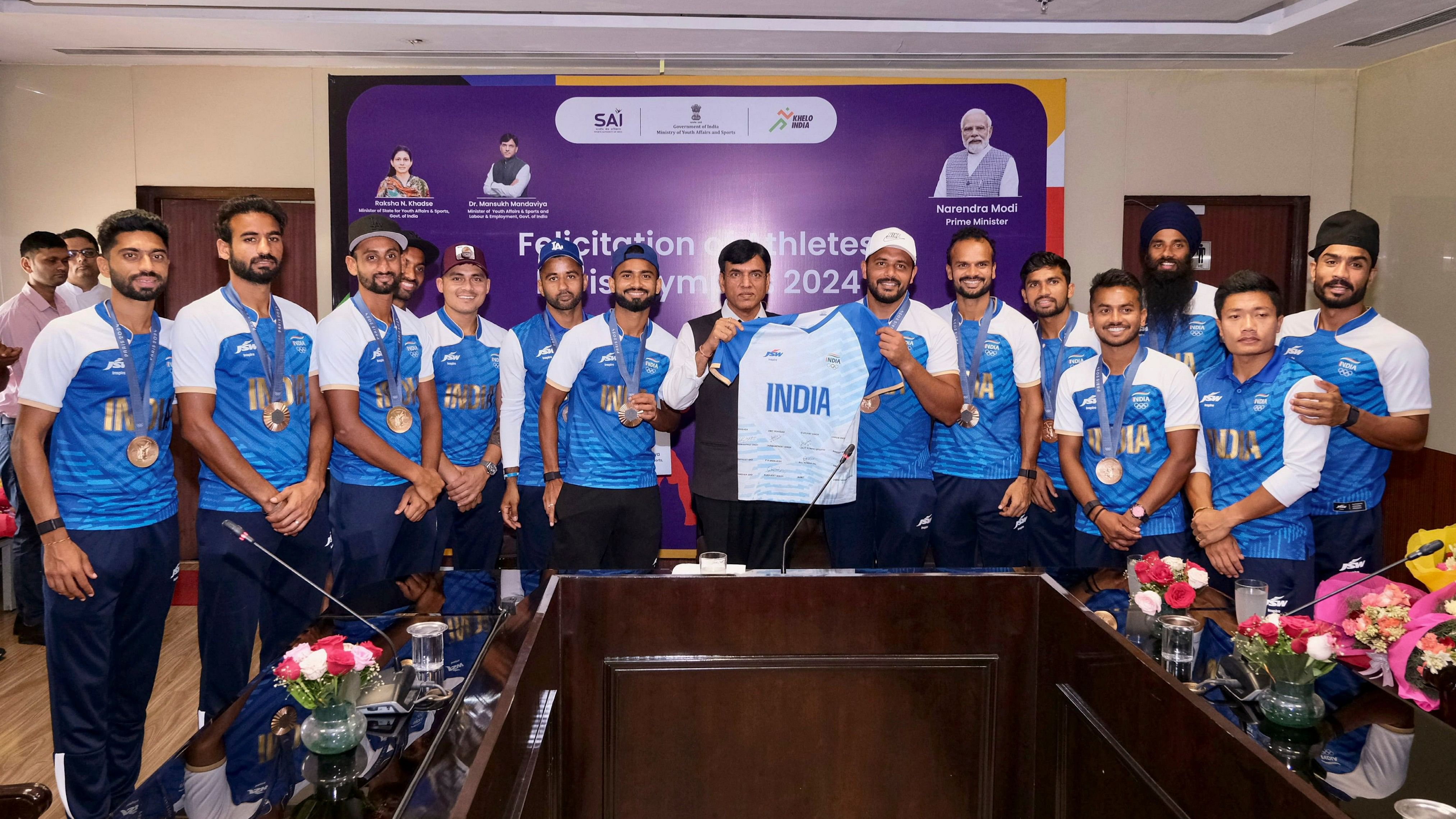
Union Sports Minister Mansukh Mandaviya poses for a group photo during a meeting with Paris Olympic Bronze medalist Indian Hockey players, at Major Dhyan Chand National Stadium, in New Delhi, Saturday, Aug. 10, 2024.
India had another poor show at the Olympics. In Paris, there were 987 medals at stake in 329 competing events in 32 sports. A total of 117 athletes from India competed for 69 medals across 16 sports. India won only six medals, or 0.6% of the total medals.
India’s population of 1.45 billion is 17.8% of the global population of 8.17 billion. In current US dollars in 2023, India’s GDP of $3.55 trillion is 3.4% of the global GDP of $105.44 trillion. India’s Olympic performance is nothing short of pathetic for a nation with such a large share of population and GDP.
A healthy, happy, and prosperous India will define a ‘Viksit Bharat’.
Globally, health standards have improved massively, with no one dying of hunger today. But access to food and nutrition varies. The Global Hunger Index (GHI) measures under-nutrition, especially in children. In the 2023 GHI, India ranked 111th out of the 125 countries.
India’s poor GHI score indicates low levels of nutrition and health in general, which is more than corroborated by performance in sporting events.
The share of medals won in international competitions is a good indicator of the health of a nation. The competitive prowess in sports is the way to win more medals. The message is clear. Sporting excellence is necessary to a ‘Healthy India’.
Can we set a big target in sports — say win 10% of the Olympics medals in 2048 — to focus our attention and energy on making India a healthy nation and becoming viksit before the 100th anniversary of our republic in 2050?
The global production of goods and services is undergoing a tectonic shift. The production of food, industrial goods, machines, energy, real estate, and infrastructure has become highly automated requiring significantly less human labour. Electronics, datafication, and artificial intelligence (AI) are currently speeding up the automation of non-personal services.
Going forward, India will also witness massive job losses in agriculture, manufacturing, and non-personal services, while value added in goods and services produced, as well as their quality, will continue to increase.
However, there is no reason to be despondent. Sports, travel, entertainment, and personal services, like health, education and training, are witnessing enormous growth, not only in their contribution to the GDP, but in employment as well.
There is all-round growth, in sporting activities across disciplines, including online gaming. Sports are attracting the youth, and this will only gather further momentum in the times to come. It is also the biggest entertainer and being a sportsperson now has a prestige associated with it. With the global population rapidly ageing, the demand for sports to entertain them is also shooting up.
Sporting events also generate big profits and high valuations: look at the Indian Premier League (IPL). Big companies are investing in sports.
Earning a single medal at the Olympics requires a lot of planning, investment, and hard work. Raw josh no longer wins medals. As we’ve seen, the mismanagement of an athlete by 100 grams can cost a gold medal.
To make India competitive in sports it requires massive investment in facilities, equipment, coaches, and athletes. The governments cannot do it alone. This will require the involvement of startups and corporates who will be interested as it will bring prestige and profits.
India should set a goal of winning 10% of the medals at the 2048 Olympics. This might sound ambitious, but could prove transformational. This will provide the right prescription for seizing India’s demographic dividend, and also provide employment opportunities for a burgeoning youth population.
India’s performance at the Asiad and the Olympics has improved over the past few decades and this has come from the youth in rural India, in wrestling, boxing, shooting, and hockey. A takeaway here is that it is a good idea to channel the raw energy of our youth in rural India into sports rather than solely focusing on skilled manufacturing.
For this to take place, sports education, and skills and technology acquisition must be made a prestigious diploma and degree course, after elementary schooling. We must invest in millions of young people for such sports courses until the age of 25 years. Also, the government must make sports education a for-profit activity to encourage startups and corporates to invest in the sector.
Let there be a vast culture of sports clubs in India’s towns/districts across disciplines with investment in creating national and global facilities and infrastructure.
India should aim to host the 2048 edition of the games. This will channel national attention and energies towards achieving this goal. This will pave the way for a healthy, happy, and prosperous Viksit Bharat.
(The writer is former Finance & Economic Affairs Secretary, and author of The Ten Trillion Dream and We Also Make Policy)